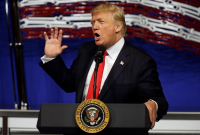Support strong Canadian climate journalism for 2025
A pair of former American ambassadors to Canada have criticized U.S. President Donald Trump for his string of remarks about the northern neighbour, calling it counter-productive to seriously resolving trade issues.
Barack Obama's last envoy to Ottawa said the occasional disagreement is inevitable in a trade relationship worth C$841-billion annually — and it's unhelpful to wail about it through the media.
"Words matter. Words matter diplomatically. Words matter with leaders. And I think the words that have been used have been unfortunate, and have not been constructive,'' Bruce Heyman told a panel in Detroit, organized Tuesday by the Council of the Great Lakes Region.
''I think if we're going to try to get things done ... I think we would probably be better off using a different tone and style."
Heyman worked on some of these same issues Trump is complaining about — softwood lumber and dairy. But unlike Trump, the former Obama administration raised its complaints discreetly, in private primarily, just alluding to them in public, and seeking to keep the dialogue positive.
By way of comparison, on Tuesday alone, Trump raised his complaints about Canada, twice, without being asked, in public remarks and in a tweet where he threatened reprisals over ultrafiltered milk regulations.
''We will not stand for this,'' Trump wrote. ''Watch!''
Both Heyman and another Democratic ex-diplomat warned this could lead to a tit-for-tat dynamic, where Canada responds, the U.S. counter-responds, things escalate and the countries settle scores instead of solving problems.
''This is where it gets really difficult to do good deals," Heyman said.
A former Bill Clinton ambassador agreed.
In fact, James Blanchard put it more bluntly. ''It's goofy stuff, unbecoming of our relationship, and frankly unbecoming of the leader of our country," said Blanchard, a Michigan governor before heading to Ottawa in the 1990s.
He said a lumber dispute makes it harder to renegotiate NAFTA.
His advice to Canada, when confronted by fiery presidential language, is to keep cool. "I don't even think the president knows what he wants to do here. He just likes to negotiate, and bully a little bit. Canada just needs not to overreact.''
That was the same advice offered by several actors Tuesday. These ex-ambassadors, the Canada-U.S. Business Council lobby group and Obama's former White House public-diplomacy director Brett Bruen all said the Canadian government should meet the complaints with calm.
Instead, said Bruen, the government should build political alliances. He urged it to speak with Americans who agree with Canada's position. For example, he suggested reaching out through the Home and Garden network to homebuyers hurt by more expensive wood.
He said that would give Canada power in a negotiation later.
The Canadian government has been working on building such alliances. It's no accident some in government have taken to renaming ''softwood lumber,'' as, ''home lumber.'' Also, federal ministers are now fanning out across the U.S.
The latest was Treasury Board president Scott Brison, who spoke at the same Detroit conference as the ex-ambassadors. He also spoke about his ongoing efforts with American colleagues to co-operate on regulations, in an effort to trim product costs.
Brison used a hockey analogy for that bilateral co-operation, one built upon the Detroit legend whose name will soon adorn a binational bridge, funded by Canada.
''A Gordie Howe hat trick is a goal, an assist and a fight. It's a bit like the Canada-U.S. trade relationship. ... The fights only last about five minutes. So let's keep our sticks on the ice,'' Brison said in an interview.
''Let's put some pucks on the net in areas where there's absolute agreement.''




Comments
I was considering setting up branches of my future manufacturing company (only because of the size of the market) in USA. Not now.
Trump is not someone who incites a great deal of confidence. He says one thing and does another...that's not the environment smart investors and growing companies want to play in. This guy is completely incapable of acting civilly toward anyone who has a different set of interests - which every company on the planet has.
He wants to be king of everything; he's going to end up destroying his country by turning the entire world against him. He's got a good start.